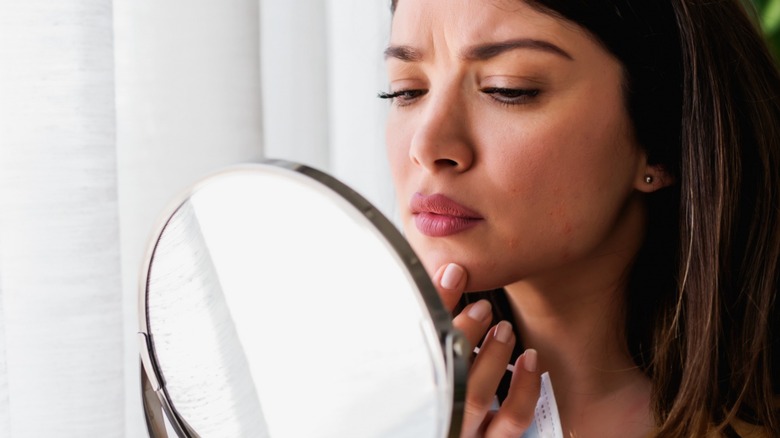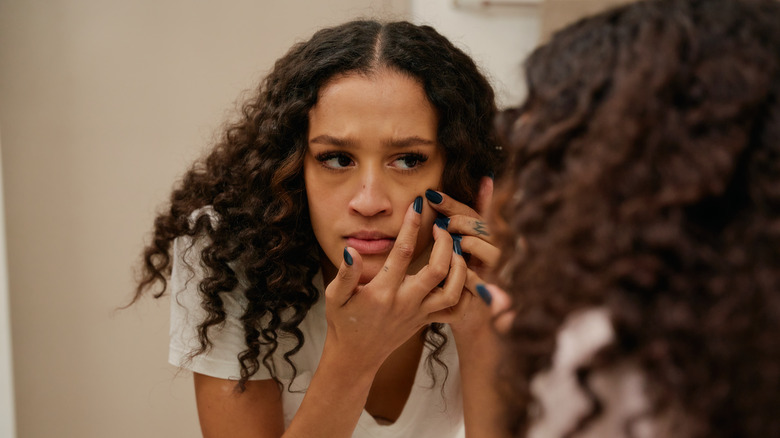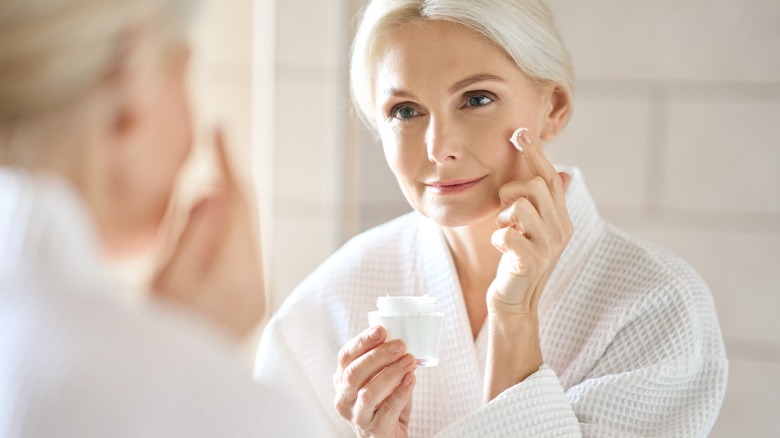'Inflammaging' Could Be The Culprit Behind Your Breakouts
The appearance of our skin can be tough to manage as is, but what happens as we age? There's the popular myth of acne being an adolescent thing — that it's something you grow out of. However, adult acne is more common than one might think, and you might have to deal with it at some point in your life.
Post-adolescent acne is on the rise in the United States, with up to 15 percent of adult women dealing with the effects. Overall, acne is the most prevalent skin condition in the country, and as many as 50 million Americans experience issues related to it every year.
One possible culprit of adult acne is inflammaging. Created by fusing the words "inflammation" and "aging," inflammaging refers to the increase in inflammation that happens in the body as it ages. Inflammation can actually be beneficial in some cases, as it enables the body to respond to infections and heal injuries. However, that changes with age. It takes a bad turn when inflammation becomes chronic, even if it's just low-grade. This inflammaging can contribute to skin issues.
How inflammaging affects breakouts
In terms of skin and adult acne, inflammaging refers to the skin's decreased ability to renew itself as one ages. "This weakens skin structure, results in the degradation of collagen and elastin, and impairs the skin's barrier function," Patty Connor, product development manager for Eminence Organic Skin Care, tells Williamsburg Organic Spa. With the skin diminished on a deeper level, it may become more sensitive and prone to blemishes.
Skin stressors are everywhere. They include things like environmental pollutants, bad eating habits, lack of exercise, and too much sun exposure. However, they hit harder as the skin ages. When in the process of inflammaging, the body is constantly in a chronic inflammatory response and is, in turn, causing tissue damage little by little, according to a study published by PubMed Central. So, you may want to start using anti-aging creams sooner than you think.
Board-certified dermatologist Tess Mauricio, M.D., tells Well and Good that "Inflammation plays a huge role in acne. There are many studies that show inflammation is a hallmark of acne, and treatments should address inflammation."
Prevent inflammaging breakouts and heal your skin
While aging is inevitable, skincare is forever. The common skin changes that happen as you age might affect how your favorite skincare products work, so it's important to tweak your routine to suit your complexion's needs at all times.
While inflammation is internal and medical consultation may be needed to eliminate its root cause and not just the effects, your breakouts need different tending. As in younger skin, it's important to treat acne on its own. "The main goal for acne-prone skin is to avoid anything that is comedogenic, or pore-clogging, and to avoid stripping the skin," Sarah Brown, CEO and founder of the organic skincare brand Pai, tells Well and Good.
The rest of the products for taking good care of your face should depend on your skin type, just as usual. Tess Mauricio, M.D., emphasizes not to use petroleum-based products or oily makeup if you're suffering from inflammaging as it can make the breakouts worse. Skincare can help heal acne and your complexion, but decreasing inflammation should be a priority for overall health. Therefore, consider bettering your lifestyle for breakout-free aging.


